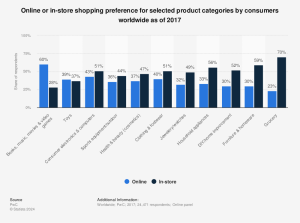Online Shopping Statistics In Nigeria

The path of online shopping statistics in Nigeria has been one that many have chosen to take over time. It involves buying and selling different kinds of products ranging from groceries to electronic, fashion accessories and shoes. Nevertheless it's growth has and seemed to not be stopped by any other shopping method. Most recently, the increase in the technological advancement of the country has prompted the increase in internet suffering. Individuals who soar through the internet looking for the easiest purchase to make.
Online shopping has also become an extremely convenient approach for them and so leads to a tremendous increase in demand for more advanced platforms that can as well satisfy their demand.
In this article, we'd looking at the latest online shopping statistics in Nigeria in 2024, and discuss the trends, and recent changes going on within the industry.
E-Commerce in Nigeria: Latest Facts and Figures in 2024

According to the bureau of Statistics, the e-commerce market revenue in Nigeria is proposed to reach $12.8 billion at the end of 2024, thereby leading to the increase in the compound annual growth rate (CAGR) from $5.6 billion in 2019 to 18.9% in 2024. A growth rate which has been been fueled by the increasing likeness for online shopping among Nigerian consumers.
Currently the e-commerce market in Nigeria is currently monopolized by a few major strategic players, with Jumia as the largest market share holder in the industry holding a share of about 34.4% as at 2021, likewise Konga holds a share of about (15.2%) keeping it at 2nd place, Jiji with a share of about (7.8%), and finally Slot with the lowest share of about (4.2%). However, the market is constantly experiencing change as individual preferences begin to dwindle with time and age, smaller niche e-tailers are now gaining more ground by providing clear distinction and segmentation of products or services to fit each consumer's preferences.
Each consumers preference surmount to a total number of about 48% for fashion and beauty,
24% for electronics and other appliances, 12% for food and beverage products purchased daily from different brands. The various products have proven to be the most searched products for Nigerian online shoppers, according to Jumia's Nigeria Mobile Trends Report 2023.
Factors Driving E-Commerce Growth in Nigeria
Some of the factors currently driving e-commerce growth in Nigeria include the following:
- Internet and mobile accessibility: The rate at which internet and smartphone users actively make use of the internet has increased tremendously over time. A total of about 98 million Nigerians make use of the internet daily with an average of about 92% having constant access to the internet via their mobile devices. This incident has become a driving force for online shoppers in Nigeria.
- Increase in the income of both middle-class and lower class citizens: As years go by, the cost of living, expense, and income have tripled as opposed to their usual number. Nigeria now experiences an increase in the population of the middle-class, with an estimated number of about 23% of the country's population. With a steady growth pattern which is now categorized as classified middle-income earners as of 2022 (African Development Bank) signifying that the country has a substantial disposable income which can help in driving the demand of individuals across different e-commerce platforms.
- Improved logistics and payment infrastructural patterns: The online shopping experience of Nigerian citizens has undergone intense development as there has been significant improvement in digital payment solutions of customers, utilizing mobile wallets and other online banking, to facilitate seamless online transactions. Additionally, improvements in logistics and delivery networks, although still a challenge, have enhanced the overall online shopping experience.
- Impact of COVID-19 pandemic on the shopping experience of individuals: Ever since the pandemic, there has been a drastic change in the online shopping experience of individuals in Nigeria. People sought for better and safer means to purchase different goods and services. The pandemic further led to behavioral change in shoppers, such that, since most persons were not allowed out of their homes, most transactions were done from home and delivered to their doorstep. It can be noted that the e-commerce industry and online shopping witnessed an increase in the traffic and number of individuals further leading to an increased growth rate.
Future Trends and Innovations in Nigerian E-Commerce
As we progress into the world of digitalization and modernization, several trends and innovations are expected to shape the industry's future some of which:
- Shopping apps and Mobile commerce: With the increase in the rate of smartphone users, e-commerce merchants are investing heavily in building a strong online presence while optimizing their platforms to be compatible with mobile devices, thereby offering shoppers a user-friendly shopping experience through their apps, and further streamlining the checkout process to soothe both big and smaller screens.
- Influencer marketing and Social commerce: In recent times, Social media platforms like Facebook, Instagram, Twitter, and WhatsApp have become very powerful channels for e-commerce in Nigeria to thrive, helping both large and medium scales businesses showcase their products, and also interact with customers thereby building both trust and relevance within the industry and further facilitate seamless transactions. Influencer marketing is increasing its boundaries daily, as e-tailers now collaborate with other popular social media personalities in order to promote their products and services.
- Omnichannel and experiential retail: E-commerce businesses in Nigeria now know the importance of omnichannel retail. They now provide better strategies to aid a better shopping experience for customers across multiple channels, from online and offline operations, to buy-online-pickup-in-store (BOPIS) options.
- Sustainable and eco-friendly e-commerce: Nigerian consumers are now driven to become a lot more mindful of the impact of e-commerce on the environment and world at large. These consumers do this by continuously driving the demand for sustainable practices ranging from eco-friendly packaging, to promoting sustainable product lines, and offsetting of carbon.
Some Digital Buyers in Nigeria 2024
According to projections by Some online websites focused on determining statistics or trends, the number of digital buyers in Nigeria is expected to reach about 38.8 million in 2024. This percentage is only a small part of the whole population and has been used to represent a significant portion of the country's population driven by increasing internet, smartphone adoption, and the accessibility offered by the different online shopping platforms.
On the other hand, the digital buyer population in Nigeria is different from each other with a provision for separation of the, different age groups, genders, and locations from each other. Previous reports suggest that the younger consumers comprising the teenagers and other young adults, especially those in urban areas, become more likely to utilize this online shopping experience as a result of their familiarity with digital technologies.
E-commerce Spending in Nigeria

As industries utilize these e-commerce platforms, a tremendous growth pattern would be discovered. The amount of online shoppers continues to grow, and the spending power of online shoppers skyrocket. But this isn't enough. According to the Nigerian Bureau of Statistics, online retail sales grew by 28.6% in 2020, and would not stop there. This growth rate would further show how the increasing popularity and acceptance of e-commerce among Nigerian consumers have heavily affected the economy.
While exact figures on average order value and size would vary across different e-commerce platforms and product categories, recent reports suggest that Nigerian online shoppers are spending more on each transaction. This trend can be as a result of several factors like the growth rate of middle-class citizens, who have begun to utilize online shopping methods more. It can also be as a result of the increase in trust of individuals who perform most online transactions, and the comfort of having a wider product preference at their disposal.
Revenue per User of E-commerce

For the e-commerce industry in Nigeria to thrive, the average revenue per user (ARPU) would be important tools used in order to validate the value attributed to certain products and services by each customer. In the e-commerce market, the ARPU value differs as time progresses and across different regions, product categories, and customer segments.
The latest industry reports, show that e-commerce merchants who target urban areas and higher-income segments experience a higher rate in their ARPU as a result of their disposable income and increased willingness to spend their money on online purchases. Similarly, other product categories like electronics, fashion, and home appliances would also experience a higher ARPU compared to other lower-ticket items users.
It is however essential to take note that ARPU can be influenced by various factors which end up affecting the growth of online shopping in 2024. Some of these factors may include, pricing strategies, the degree of customer loyalty towards a brand fostered as a result of programs in which they run, and the overall shopping statistics influenced by e-commerce platforms. As we progress further into the digital economy, only businesses which can optimize their offers to soothe the preference of different individuals and provide exceptional value to customers will likely succeed in getting an increased ARPU.
Finally, it is important to note that the online shopping statistics in Nigeria would continue to rise above it's usual values and adapt to the ever changing world, optimizing it's procedure to fit into every sector. Their pattern would be further driven by increasing digital adoption, changing consumer preferences, and innovative business models. Even as the industry continues to grow and mature, progressively moving into the digital economy era, companies who run e-commerce brands would also learn to understand and follow in on emerging trends, making use of recent technological advancement materials like the artificial intelligence, as well as providing their customers with a personalized experience in order to well-positioned them in the market.
Getting rid of or putting the right logistics infrastructure in place would help to ensure the sustainable growth of the Nigerian e-commerce industry and by doing so, we can foster collaboration among other businesses, and government agencies within the country.
By kingkentus


No comments:
Post a Comment